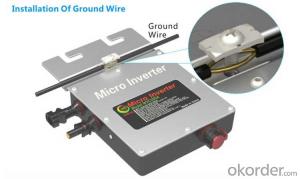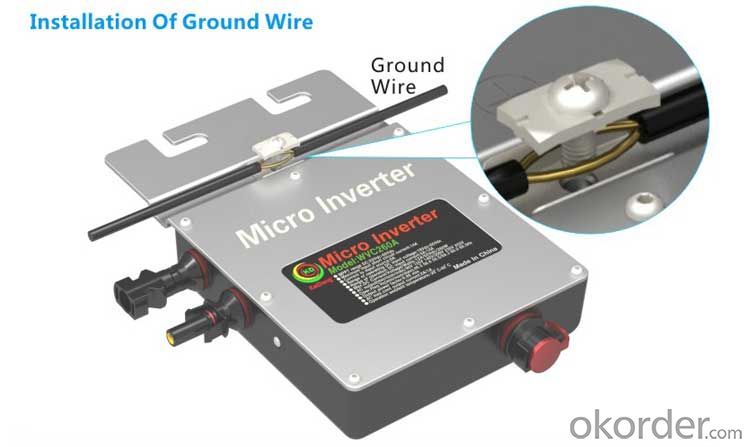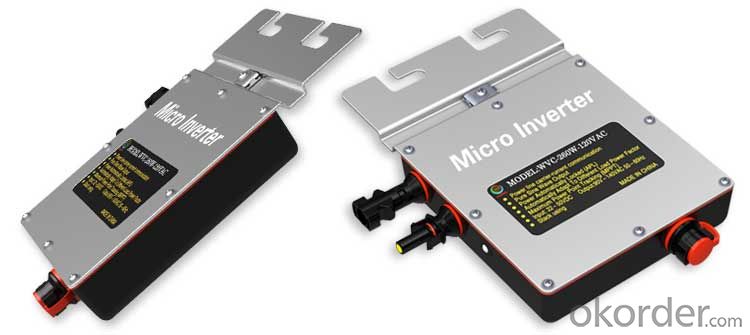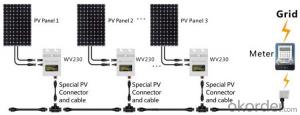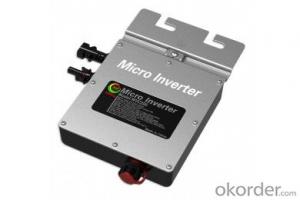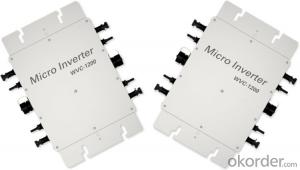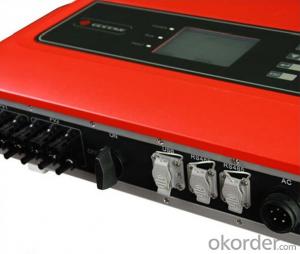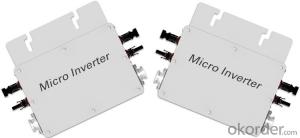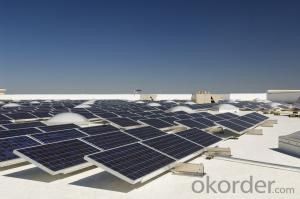Solar Inverter 10kva KD-WV230 Interver, 260W, High Efficiency & Best Cost-Effectiveness
- Loading Port:
- China main port
- Payment Terms:
- TT OR LC
- Min Order Qty:
- 1000 pc
- Supply Capability:
- 100000 pc/month
OKorder Service Pledge
OKorder Financial Service
You Might Also Like
Structure
DC input voltage range:22-50VDC
AC output voltage range:80-160VAC/180-260VAC
AC output power :260W
AC frequency range:50Hz/60Hz
G.W.:1.1kg
Size:250mm*200mm*60mm
KD-WV230 Series Using IP67 waterproof streamline design, Can effectively prevent rainwater on the surface erosion, Built-in high-performance Maximum Power Point Tracking(MPPT)Function,Better able to track changes in the solar luminosity and control different output power, Effectively capture and collect sunlight. AC electric power transmission using the reverse transmission technology, Is one of our patented technology, The inverter output power can provide load priority use, Extra electricity to the grid, Efficient use of the inverter to the power emitted, Electricity transmission rate of up to 99%.
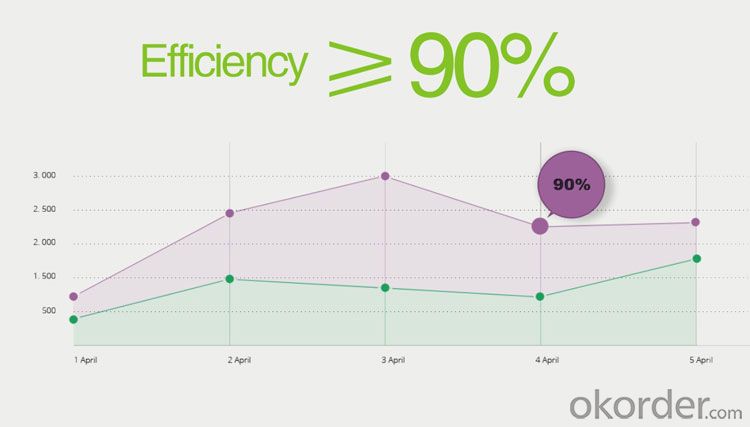
Features

Pure Sine Wave Output;
High performance Maximum Power Point Tracking(MPPT);
Power Automatically Locked(APL);
Reverse power transmission;
High-Frequency High Conversion Rate;
Anti-Islanding Protect;
Input /output is fully isolated to protect the electrical safety;
Multiple parallel stacking;
The Leading Patent Technology;
IP67 WaterProof;
Flexible Installation;
Simplify maintenance (user serviceable)
High Efficiency & Best Cost-Effectiveness
Images
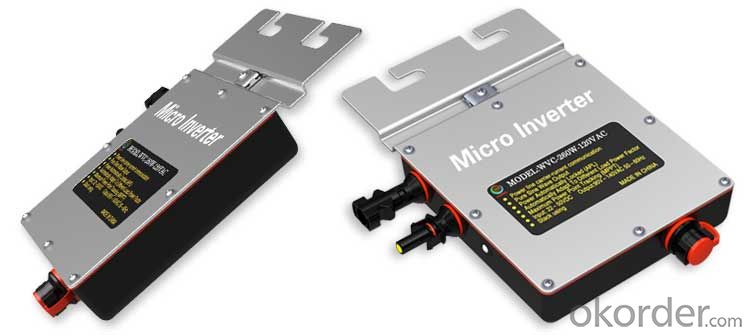

Specification
Input Data | KD-WV230-120VAC/230VAC | ||||
Recommended input power | 200-300Watt | ||||
Recommend the use of PV modules | 300W/Vmp>34V/Voc<50V | ||||
Maximum input DC voltage | 50V | ||||
Peak power tracking voltage | 25-40V | ||||
Operating Voltage Range | 17-50V | ||||
Min / Max start voltage | 22-50V | ||||
Maximum DC short current | 15A | ||||
Maximum Input Current | 9.8A | ||||
Output Data | @120VAC | @230VAC | |||
Peak power output | 260Watt | 260Watt | |||
Rated output power | 250Watt | 250Watt | |||
Rated output current | 2.08A | 0.92A | |||
Rated voltage range | 80-160VAC | 180-260VAC | |||
Rated frequency range | 57-62.5Hz | 47-52.5Hz | |||
Power factor | >96% | >96% | |||
Maximum units per branch circuit | 15PCS(Single-phase) | 30PCS(Single-phase) | |||
Output Efficiency | @120VAC | @230VAC | |||
Static MPPT efficiency | 99.5% | 99.5% | |||
Maximum output efficiency | 92.3% | 94.6% | |||
The average efficiency | 91.2% | 93.1% | |||
Night time power consumption | <50mW Max | <70mW Max | |||
THDI | <5% | <5% | |||
Exterior | |||||
Ambient temperature | -40°C to +60°C | ||||
Operating temperature range (inverter inside) | -40°C to +82°C | ||||
Dimensions (WxHxD) | 195mm*130mm*32mm | ||||
Weight | 0.65kg | ||||
Waterproof Rating | IP67 | ||||
Cooling | Self-cooling | ||||
Feature | |||||
Power transmission mode | Reverse transfer, load priority | ||||
Electromagnetic compatibility | EN50081.part1EN50082.part1 | ||||
Grid disturbance | EN61000-3-2 Safety EN62109 | ||||
Grid detection | DIN VDE 1026 UL1741 | ||||
Certificate | CEC,CE National patent technology | ||||
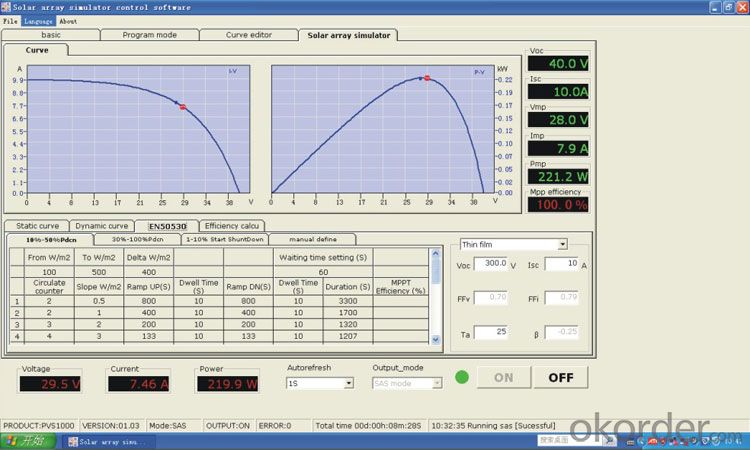 | |||||
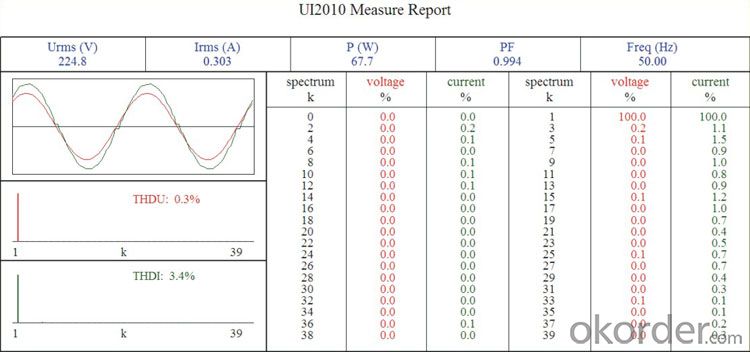
FAQ
Can we visit your factory?
Surely, I will arrange the trip basing on your business schedule.
Can you do OEM for us?
Yes, we can.
How do you pack your products?
We have rich experience on how to pack the panels to make sure the safety on shipment when it arrives at the destination.
Can you help us install the module if we cooperate with you?
We haven’t entered into installation sector, but we have the plan in near future.
- Q: How does a solar inverter handle voltage regulation in the grid?
- A solar inverter regulates voltage in the grid by converting the DC power generated by the solar panels into AC power that matches the voltage and frequency of the grid. It monitors the grid's voltage level and adjusts the output accordingly to ensure a stable and consistent supply of power. Additionally, it also helps in maintaining power quality by maintaining the grid's voltage within the specified range and compensating for fluctuations or variations in voltage levels.
- Q: What is the role of capacitors in a solar inverter?
- The role of capacitors in a solar inverter is to store and release electrical energy in order to regulate and smooth out the flow of power. They help to stabilize the voltage levels, filter out any fluctuations or noise in the electrical signal, and provide a reserve of power for sudden increases in demand. Capacitors also improve the overall efficiency and performance of the solar inverter by reducing the strain on other components and preventing damage from power surges or spikes.
- Q: Can a solar inverter be used in a multi-string configuration?
- Yes, a solar inverter can be used in a multi-string configuration. In fact, many solar installations utilize multiple strings of solar panels connected to a single inverter. This allows for increased efficiency, flexibility, and the ability to harvest more energy from the sun.
- Q: How does a solar inverter handle temperature variations?
- A solar inverter handles temperature variations by employing various cooling mechanisms such as heat sinks, fans, or liquid cooling systems. These components help dissipate excess heat generated during operation, ensuring the inverter remains within its optimal temperature range. Additionally, advanced inverters are equipped with temperature sensors that continuously monitor the internal temperature and adjust the system's performance to maintain efficiency and protect against overheating.
- Q: How does a solar inverter handle power export limitations imposed by the grid?
- A solar inverter handles power export limitations imposed by the grid through a process called power factor control. The inverter continuously monitors the grid's voltage and frequency, adjusting its power output accordingly. If the grid imposes limitations on power export, the inverter reduces its output to stay within the allowed limits. This ensures that the solar system operates in compliance with the grid regulations and prevents any excess power from flowing back into the grid.
- Q: What is the maximum DC input current for a solar inverter?
- The maximum DC input current for a solar inverter can vary depending on the specific model and manufacturer. It typically ranges from a few amps to several hundred amps, depending on the size and capacity of the inverter.
- Q: Can a solar inverter be used with a solar-powered disaster relief system?
- Yes, a solar inverter can be used with a solar-powered disaster relief system. A solar inverter is an essential component that converts the direct current (DC) generated by the solar panels into alternating current (AC), which is the form of electricity used in most appliances and the electrical grid. By using a solar inverter, the solar-powered disaster relief system can efficiently convert and utilize solar energy to power various devices and equipment needed in disaster relief efforts.
- Q: Can a solar inverter be used in a remote location without access to the grid?
- No, a solar inverter cannot be used in a remote location without access to the grid. Solar inverters convert DC power generated by solar panels into AC power, which is suitable for use in homes and businesses connected to the electrical grid. Without access to the grid, there is no way to utilize the output of a solar inverter.
- Q: What is the lifespan of a solar inverter?
- The lifespan of a solar inverter typically ranges from 10 to 20 years, depending on various factors such as the quality of the inverter, usage patterns, maintenance, and environmental conditions.
- Q: Can a solar inverter be used in areas with high electromagnetic radiation?
- Yes, a solar inverter can be used in areas with high electromagnetic radiation. However, it is important to consider the specific requirements and limitations of the inverter as some models may have different tolerance levels for electromagnetic interference. It is recommended to consult the manufacturer's specifications or seek professional advice to ensure proper functioning and safety in such environments.
Send your message to us
Solar Inverter 10kva KD-WV230 Interver, 260W, High Efficiency & Best Cost-Effectiveness
- Loading Port:
- China main port
- Payment Terms:
- TT OR LC
- Min Order Qty:
- 1000 pc
- Supply Capability:
- 100000 pc/month
OKorder Service Pledge
OKorder Financial Service
Similar products
Hot products
Hot Searches
Related keywords
